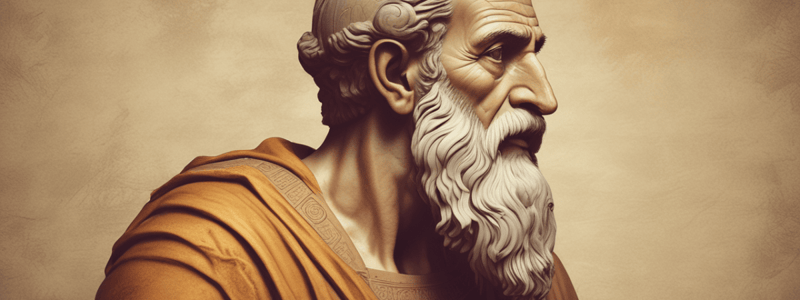Podcast
Questions and Answers
What is Herodotus known as?
What is Herodotus known as?
- The Father of Philosophy
- The Father of Science
- The Father of Literature
- The Father of History (correct)
What was the main subject of Herodotus' work, The History?
What was the main subject of Herodotus' work, The History?
- The history of Greece
- The life of Xerxes
- The Battle of Salamis
- The Persian War (correct)
What was unique about Herodotus' approach to history?
What was unique about Herodotus' approach to history?
- He focused on the role of gods in history
- He attributed events to natural phenomena
- He wrote only about Greece
- He took a neutral, scientific stance (correct)
What was the approximate number of ships the Persian navy had at the Battle of Salamis?
What was the approximate number of ships the Persian navy had at the Battle of Salamis?
What type of ships did the Greeks use to attack the Persian vessels at the Battle of Salamis?
What type of ships did the Greeks use to attack the Persian vessels at the Battle of Salamis?
What was the outcome of the Battle of Salamis?
What was the outcome of the Battle of Salamis?
What was the primary goal of Darius the Great's invasion of Greece in 492 BCE?
What was the primary goal of Darius the Great's invasion of Greece in 492 BCE?
What was a key factor in the Greek victory at the Battle of Marathon in 490 BCE?
What was a key factor in the Greek victory at the Battle of Marathon in 490 BCE?
What is a major criticism of Herodotus's work?
What is a major criticism of Herodotus's work?
What title was given to Herodotus because of his approach to history?
What title was given to Herodotus because of his approach to history?
Flashcards are hidden until you start studying
Study Notes
Herodotus and The History
- Herodotus was a Greek historian who lived from 484 to 420 BCE and is known as the "Father of History" for his contributions to the field.
- He is most famous for his account of the Persian War, which he titled The History (also known as The Histories).
- The History is a scientific, rational, and largely unbiased account of historical events, unlike many of his contemporaries who attributed events to the work of gods or natural phenomena.
The Persian War
- The Persian War was a significant event that spanned much of Herodotus' life, from 492 to 449 BCE.
- The war was fought between Greece and Persia for control of the Mediterranean.
- Although Persia seemed to be a more dominant power initially, Greece's army and leaders defeated the Persians.
The Battle of Salamis
- The Battle of Salamis was a key event in the Persian War, where the Greek leader Themistocles lured the large Persian ships into the narrow space of the Strait of Salamis.
- The Greeks then used their specialized, small ships called triremes to attack the Persian ships, sinking about 300 vessels.
- The Greek victory in the Battle of Salamis delayed Persia's advances on Greece for nearly a year.
Greek Culture and Nationalism
- The Greek victory in the Battle of Salamis led to great pride and nationalism towards Themistocles and the culture of Greece.
- Greek culture became the model for Western civilization.
Structure of The History
- The History is broken into nine books, with the first four covering the culture, history, and social structure of the Persian Empire, and the last five covering the events of the war.
- Herodotus likely structured the book this way to provide context for the Greek people to understand the war.
Persian Empire and Darius the Great
- Darius the Great invaded Greece in 492 BCE, starting the Persian War, to stop the Greeks from colonizing his empire and to stop the rebellions they were instigating in Persia.
- The first part of the Persian War ended in Greek victory in 490 BCE.
Greek and Persian Armies
- Herodotus details the differences between the Greek and Persian approaches to fighting, including the way soldiers were armed, the use of the phalanx, and the team mentality of the Greek phalanx.
- Greek soldiers were more disciplined, skilled at hand-to-hand combat, and were free men, whereas Persian soldiers were lightly armed, avoided hand-to-hand combat, and were servants or subjects of the empire.
Legacy and Controversy of Herodotus
- Herodotus is regarded as one of the most important historians of all time for his rational approach to history and attention to detail.
- He was given the title "Father of History" for his contributions to the field.
- One of the major criticisms of his work is that he included personal narration, which led to some personal bias.
Studying That Suits You
Use AI to generate personalized quizzes and flashcards to suit your learning preferences.




